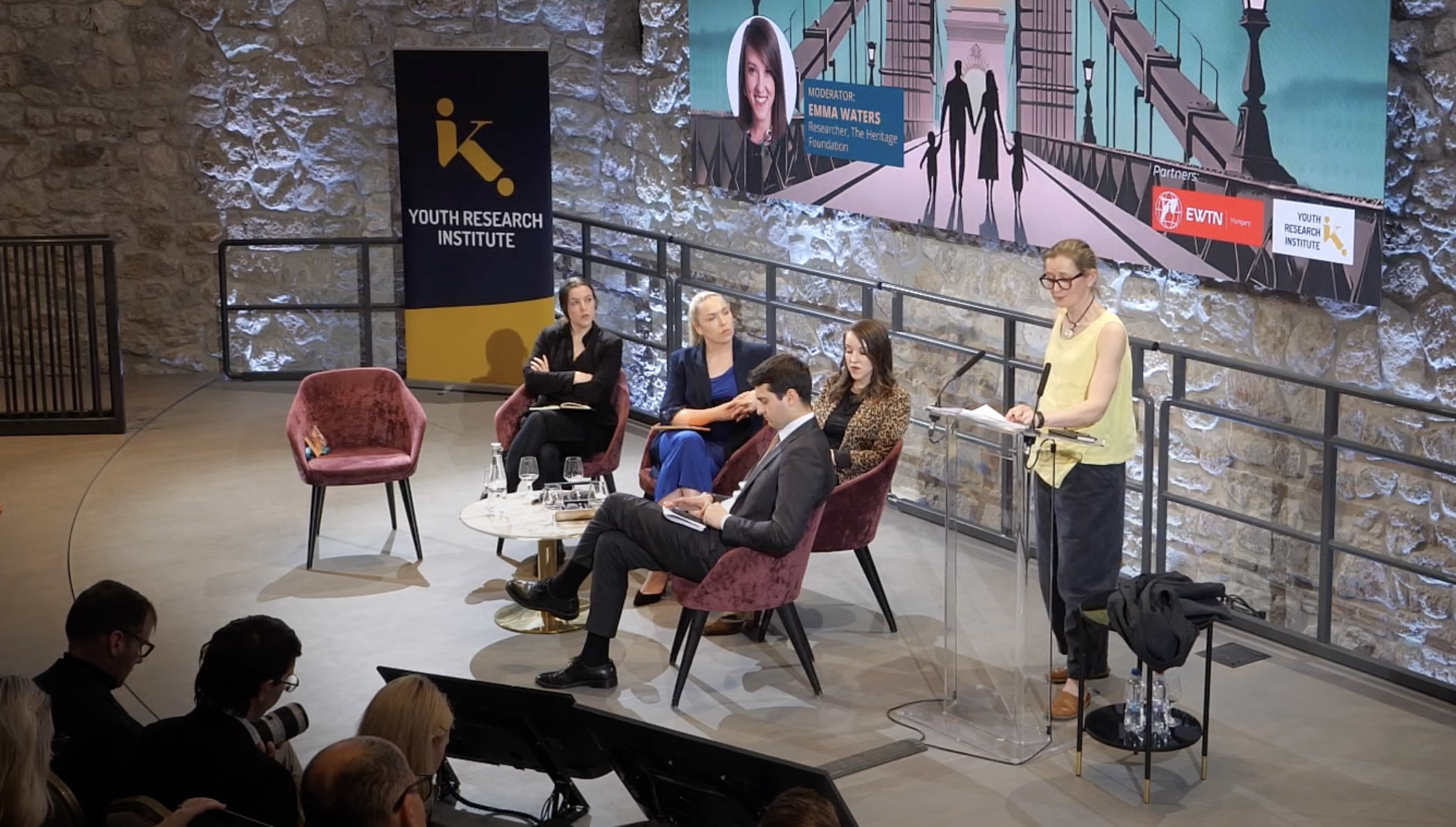
The Danube Institute Family Formation conference aspires to be a platform where the geopolitical, cultural, and legal dimensions of demographic change are discussed, setting an example for the international community.
In the face of the global decline in birthrates, every country has three options. The Western model: low birth rates and migration. The East Asian model: low birth rates and no to low migration, and the Hungarian model: improve birth rates with no to low migration. So began István Kiss, the Executive Director of the Danube Institute, which hosted the vital recent two-day conference in Budapest “Family Formation and the Future” (videos of the talks are already up).
It is admiration for Hungary’s efforts to buck the trend and create a society that is genuinely family-first that brings the speakers, many of them American, to this excellent city. Hungary, as Balázs Hankó, the Hungarian Minister for Culture and Innovation, pointed out, is battle-hardened. Its long history of division and occupation gives Hungary’s current bid to take hold of its destiny an epic quality, as well as presenting a model for other countries to learn from.
Enjoy independent, ad-free journalism - delivered to your inbox each week
The EU’s punishing of Hungary—as of last year, the country is forced to pay 1 million euros a day for its purported failure to comply with asylum laws—is severe. But one is left with the impression that Hungary will never relinquish its sovereignty, and why should it? We have seen how Europe is punishing any populist leader who dares to channel what the people think: on the question of protecting its future, Hungary is simply not suicidal.
Countries that opted for immigration to replace populations have faced extremely negative consequences, ranging from a further depression in the birth rate of the native population, lowering wages, and the cultural and social impacts of non-assimilation. As Philip Pilkington pointed out, there are two drivers of growth: productivity and population growth. Many countries have opted to emphasize productivity at the expense of population, causing stagnation. This is, to say the least, madness. With Trump’s latest tariff move, we are perhaps seeing the end of the neoliberal project: will other countries be able to follow suit, prioritizing natives, and valuing families in particular? Will children remember their filial duties to take care of their ageing parents? How might this work (or not) with the need to labor?
Countries that opted for immigration to replace populations have faced extremely negative consequences, ranging from a further depression in the birth rate of the native population, lowering wages, and the cultural and social impacts of non-assimilation.
Via a variety of income tax breaks and other incentives, Hungary now has the third-highest birthrate in Europe, behind Bulgaria and France (though none are at the replacement rate of 2.1 children per woman). Interestingly, for those who baulk at the idea of providing incentives for women to have children, Hungary has closed the gender pay gap. Three years maternity leave is covered, and tax deductions can also be used by fathers. There is work for everyone. Divorce rates have been cut in half. Walking around Budapest, the visitor is struck by the number of playgrounds, the peaceful atmosphere, and an ambient sense of trust and hope. It is perhaps too soon to say whether Hungary’s efforts will pay off, but their vision is undeniably positive, and already creating a family based less on the consumerist, liberal subject than on the family as the cornerstone of the whole society.
Balázs Orbán, Prime Minister Viktor Orbán’s Political Director, spoke convincingly of both the collapse of the liberal world order and the need for small nations to be renewable. The liberal order, he said, assumes that its values are universal, but also cannot reproduce the foundations—in the west, these are Christian—of its own existence. Many of the speakers spoke openly about their faith, and many talked about having six or seven children. Astonishing!
But why is the birth rate collapsing, more or less everywhere? This is a deep and difficult question. Speakers referenced the anti-natalism of progressive ideology, particularly the “green” idea that human beings are parasites; some spoke about the collapse in ideas of responsibility, duties, community, the reduction in church-going and a nihilistic turn away from transcendence. Others noted problems in young people having access to housing and how economic insecurity prevents commitment to marriage and children. There were references to the sexual revolution, divorce, the pill, abortion, modernity-caused infertility, the opioid crisis and pornography. Fatherlessness, particularly in the UK and US was invoked (former MP Miriam Cates spoke about how parental separation now features in nearly 50% of UK families). Brad Littlejohn spoke passionately about “screen-based childhoods” and the robbing of childhood via early exposure to violent and sexual imagery. He pointed to the power of alliances between unlikely bedfellows: radical feminists, mothers, traditionalists, conservatives and religious people in the bid to protect childhood.

Brad Littlejohn warned that screen-based childhoods steal innocence through early exposure to harmful content.
There is a loss of character formation, remarked Erika Bachiochi, and a degeneration in the inculcation of the virtues of each sex. Alex Kaschuta described how technology induced suspicion between the sexes, and Catherine Pakaluk, in a beautiful analogy, compared the shift between horses and cars to the way in which children are no longer needed for their labour and intra-family care: once again, affluence rears its head—this was perhaps the most surprising insight of the whole conference. Society needs children, but one household doesn’t need children, Pakaluk summarized. Thus do people, bar “child-enthusiasts”, feel that they don’t have any reason to reproduce. Natalism, she said, is not the default: people are rational in their calculation. It seems to me key to begin with this, however counter-intuitive it might seem (surely most people want children? Not exactly, it seems).
Marrying later emerged as a central theme, not least because people are then less able (if they marry at all) to have as many children as they might want: nature is a cruel mistress, and we forget it at our peril. Louise Perry made the very interesting point that affluence appears to be a key factor: once people in any country hit a certain level of income (she placed this around $10K), the birthrate begins dropping. Perhaps there is, she said, something inherently negative about a richer life, seeing as affluence seems to operate as a kind of self-destruct button. She suggested that the future belongs to highly religious countries that have managed to navigate modernity without being corrupted by it: we perhaps cannot avoid population collapse, but some will survive. Solene Tadie spoke about an extraordinary and recent increase in the number of young men (in particular) in France returning to the church, and the way in which Islam is provoking many to reembrace their own tradition, even in the face of a collapse in the family transmission of religion. Here online Catholic influencers seem to be playing a positive role. I spoke too about how people are breaking with nihilism and virtual life through romanticism, nature and horror, and the way in which the internet is increasingly perceived as a machine for surveillance and containment: will we see a turn away from the machine, back, in the first place, towards the outside and then, perhaps, to transcendence?
Marrying later emerged as a central theme, not least because people are then less able (if they marry at all) to have as many children as they might want: nature is a cruel mistress, and we forget it at our peril. Louise Perry made the very interesting point that affluence appears to be a key factor: once people in any country hit a certain level of income (she placed this around $10K), the birthrate begins dropping. Perhaps there is, she said, something inherently negative about a richer life, seeing as affluence seems to operate as a kind of self-destruct button.
There is no doubt that the question of marriage, children, and families is urgent. It touches on everything, and involves all of us. As organizer, Helen Roy put it: these are metaphysical questions, involving justice and love: who are we? What and who are we for? This was an honest and open conference that sought explanation and understanding rather than blame. No one claimed to have all the answers: this conversation is serious and on-going. Countries do not need to accept their own death: it is possible to come back from rock bottom. Hope in the future is both necessary and beautiful.




Comments (2)
Only supporting or founding members can comment on our articles.